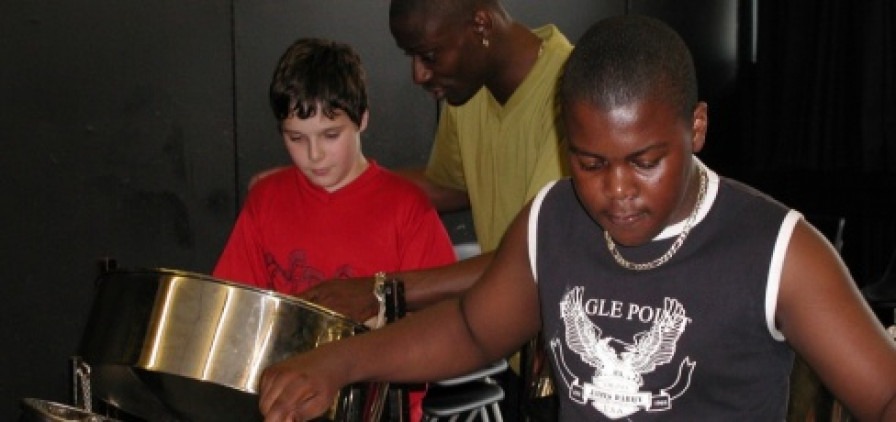Organisations' Journeys Through Music-based Mentoring: Nottingham City Music Service

A Case Study from the Youth Music Mentors programme ...
This page is part of a resource pack on Music-based mentoring.
ABOUT NOTTINGHAM CITY MUSIC SERVICE
The Nottingham City Music Service provides and supports a range of musical opportunities for young people and schools in Nottingham City.
NOTTINGHAM CITY MUSIC SERVICE and music-based mentoring
Nottingham music service’s mentoring project (NMS) is based in a big building in the centre of the city, just round the back of the Nottingham Playhouse. Various music activities take place here and at other locations around the city, including Nottingham Music School based at Ellis Guilford school, Old Basford which has orchestras, a Band Factory (“guidance and feedback from professional musicians who have worked with the likes of The Prodigy, Massive Attack”) a range of percussive world musics and choirs (“everything from gospel, folk and pop songs to world music. We also welcome aspiring songwriters with original material.”)
The small foyer can act almost as a drop-in centre. While waiting for a mentoring session to start, R flops on a waiting-room chair, pulls out a bass guitar and plucks a few notes while passing pleasantries with Kate, the coordinator. He’s joined by J and they swap chords and techniques: peer learning of a type that would be recognised by Musical Futures (the music service was a pilot for Musical Futures’ work a few years ago).
NMS’s programmes have involved several mentors, including Richard (an advanced mentor), Claire, Hannah (who’s risen up through the ranks from being a peer mentor), and a number of other peer mentors. The basic operation is ensemble work, within which one to one music sessions may be held if there are enough mentors or peer mentors to cover the group. Richard runs a drumming group (African, hand and stick drums); Claire runs bands (keyboard, guitar, bass, vocals). As long as the ensembles are running mentees are welcome: there are no set start or finishing dates.
Referrals have included a partnership with an education base linked to a hospital unit for eating disorders; and others from the adoption and fostering service and targeted youth support. But many referrals are more informal, young people who are known to the project through a variety of routes: a mentor who teaches the young person at a special school, for example. Kate’s organisational skills and her desire to have a good understanding of all the mentees and mentors on her project mean that record-keeping is good, and an individual action plan for each new mentee is completed at or soon after the start of the relationship.
Both Claire and Richard describe the sessions as music ones. Ones that the rest of the service would probably recognise as such – despite the largely non-western-classical instrumentation and the perhaps more relaxed attitude to lesson plans. But there is also personal and social development going on within the sessions the whole time, – driven by Claire’s youth worker background, or Richard’s empathetic and emotionally-intelligent approach. Richard, who also teaches drums ‘straight’ describes the difference as one of intent: not just about teaching techniques and rhythms, but also about an intent to “develop the group, how they relate to each other”. Formalised personal mentoring is not so obvious from either mentor, but examples of listening and giving advice to mentees on personal issues abound.
In fact, formality is something the mentors deliberately shy away from in most instances. They say they usually have little formal pre-knowledge of the background of their mentees or of the impact of their specific challenges; and they say they wouldn’t want to make formal assessments of their mentees’ personal and social development. Yet they both describe quite formal, if not formally written down, processes for assessing their mentees’ musical abilities and potential.

